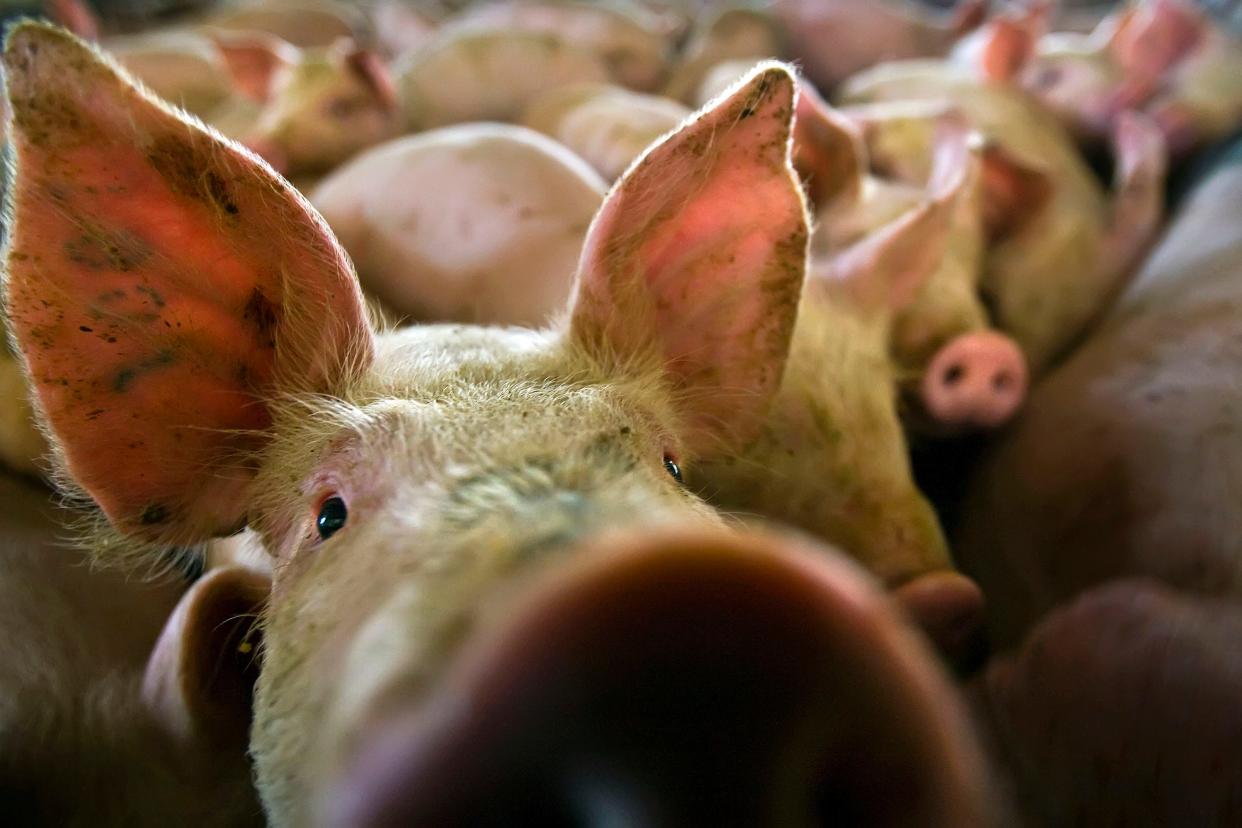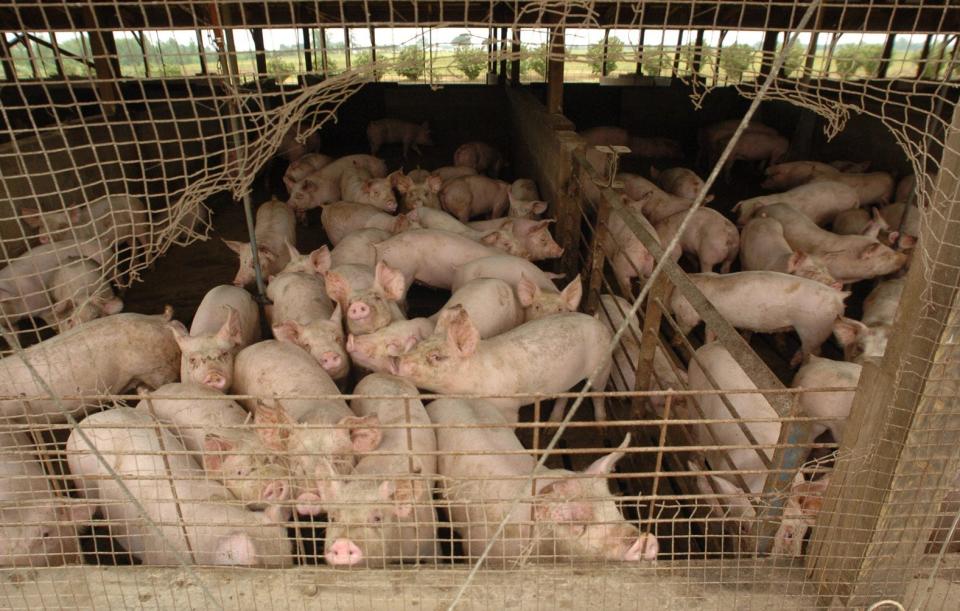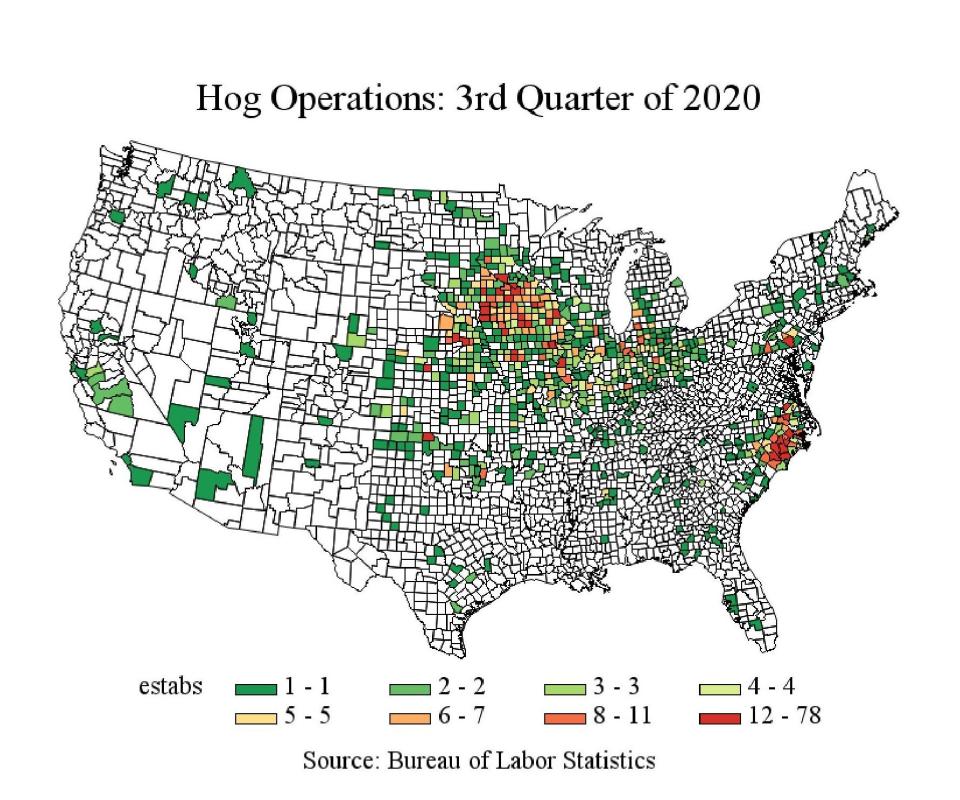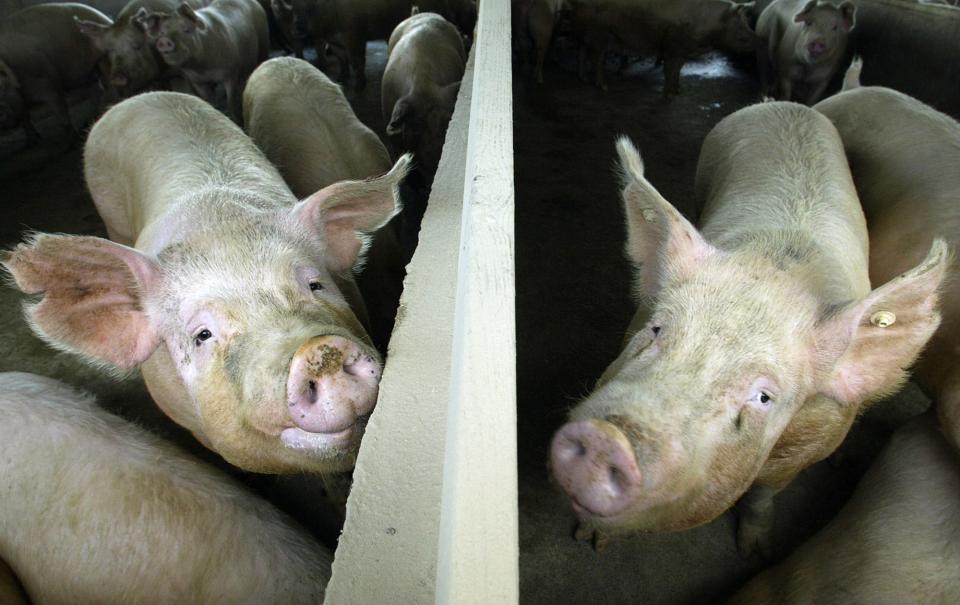Why a move by California could mean financial pain, higher costs for NC hog farmers

What happens in California isn't staying in California, and that has North Carolina's hog farmers worried.
In 2018, voters in the Golden State approved Proposition 12. Called the "Farm Animal Confinement Initiative," the law changed the requirements on how farm animals are raised if products from those animals are to be sold in California − even if the animals were raised and processed somewhere else.
After years of legal fighting, the new regulations are scheduled to go into effect at the end of the year. Here's what they say and what it could mean for Tar Heel State farmers 3,000 miles from California.
What does Prop 12 say?
Proposition 12 is a law that California voters passed in 2018 to define the minimum amount of space that farmers must give to cows, pigs and chickens that are held in confinement.
According to the California Department of Education website, "regulations require veal calves, breeding pigs, and egg-laying hens to be housed in systems that comply with specific standards for freedom of movement, cage-free design, and specified minimum floor space." For pigs that would include the banning of gestation crates, which don't allow sows to turn around during their pregnancy, and require at least 24 square feet of living space to allow the pigs to turn around and extend their limbs. Smithfield Foods, the largest pork producer in the world and a major player in the North Carolina market, eliminated gestation crates on its company-owned farms in 2018.
But the main sticking point for the pork industry is that the new rules would apply to pork producers outside of California if they wanted to sell their products there. The state, the largest domestic market for pork, is estimated to represent nearly 15% of the U.S. demand, but produces less than 1% of the supply.
If approved in 2018, why is Prop 12 back in the news now?
In May, the U.S. Supreme Court, in a 5-4 ruling, upheld California's right to enforce Proposition 12.
Justice Neil Gorsuch, writing for the majority, said California voters overwhelmingly endorsed the "ethical pork" law and have the right to decide what products appear on the state's store shelves.
"Companies that choose to sell products in various states must normally comply with the laws of those various states," Gorsuch wrote. "While the Constitution addresses many weighty issues, the type of pork chops California merchants may sell is not on that list."

The pork industry, supported by the Biden administration, had argued that the regulations violated the federal government's Commerce Clause by impacting the ability of producers in one state to sell their products in another state.
The new rules are scheduled to come into effect Jan. 1.
How big is the pork industry in NC?
According to the N.C. Pork Council, there were 8.2 million hogs and pigs in the state at the end of 2022. The industry, which ranks third in the nation behind Iowa and Minnesota, supports 44,000 jobs and generates $10 billion in economic output for the state.
In much of Eastern North Carolina, the pork industry is the top economic engine. In Bladen County, home to the world largest pork processing plant in Tar Heel, the pork industry has an economic impact of $2,54 billion and supports 7,500 jobs − 44% of the county's total employment. Next door in Duplin County, the industry has an economic impact of $800 million and supports more than 4,000 jobs, according to the council.
North Carolina exports more than 25% of its pork, with the biggest foreign markets for U.S. pork being Mexico, Japan and China.

What could be the economic impacts from Prop 12?
For farmers, it could mean a lot of additional cost and debt.
According to a 2021 economic report by Dr. Barry Goodwin, an economist with N.C. State University, renovating barns or constructing new ones could cost more than $3,500 per hog for farms with 5,200 animals, or roughly $15.6 million. For smaller operations, the figure per sow would be higher − in some cases significantly.
"The sectoral changes that Proposition 12 is likely to trigger will be unfavorable for smaller hog farms, who will have less access to credit and who will be less able to undertake the investments necessary to bring facilities into compliance with the space requirements of the proposition," the report states. "This will hasten the concentration of the hog industry, with smaller farms exiting the sector, leading a U.S. hog industry that has fewer but larger farms."
Nearly 89% of permitted pig farms in North Carolina are family owned, according to the pork council.
Then there's the headache of separating and tracking California-compliant pork from non-complaint pork. That has some farmers worried that the major pork processors will force all farmers to become California-compliant because of the challenges and difficulties of tracking pork products as they change hands and cross state lines.

What happens now?
A 2021 report by Rabobank, a financial services firm focused on agribusiness, estimated that only about 4% of the country's hog housing met the Proposition 21 standards.
That figure has likely gone up since then, but not by enough to meet California's market demands by 2024. That could mean a pork deficit and higher prices in California and a surplus of pork flooding the rest of the country, pleasing consumers but depressing prices for farmers, the Rabobank report stated.
In a statement put out after the Supreme Court ruling, Roy Lee Lindsey, CEO of the N.C. Pork Council, said the move by California will heap additional financial burdens and uncertainty on farmers just when their production costs for everything from labor to feed and supplies are already surging.
"Nothing in Proposition 12 will help farmers deal with these record costs," Lindsey wrote. "In fact, compliance with Proposition 12 will significantly increase costs for N.C. hog farmers with no corresponding return on that investment."
So will North Carolina's family-run farms choose to adapt to survive the new market realities?
"This remains to be seen," said Dr. Kelly Zering, an agricultural economist at N.C. State, via email. "To the extent that producing weaned pigs in compliance with Proposition 12 costs more, all producers including small family-run farms will have to decide if the new niche market offers a sufficient price premium to cover the additional cost and risk."
Reporter Gareth McGrath can be reached at GMcGrath@Gannett.com or @GarethMcGrathSN on Twitter. This story was produced with financial support from 1Earth Fund and the Prentice Foundation. The USA TODAY Network maintains full editorial control of the work.
This article originally appeared on Wilmington StarNews: California Proposition 12 impact on NC pork producers and farmers

